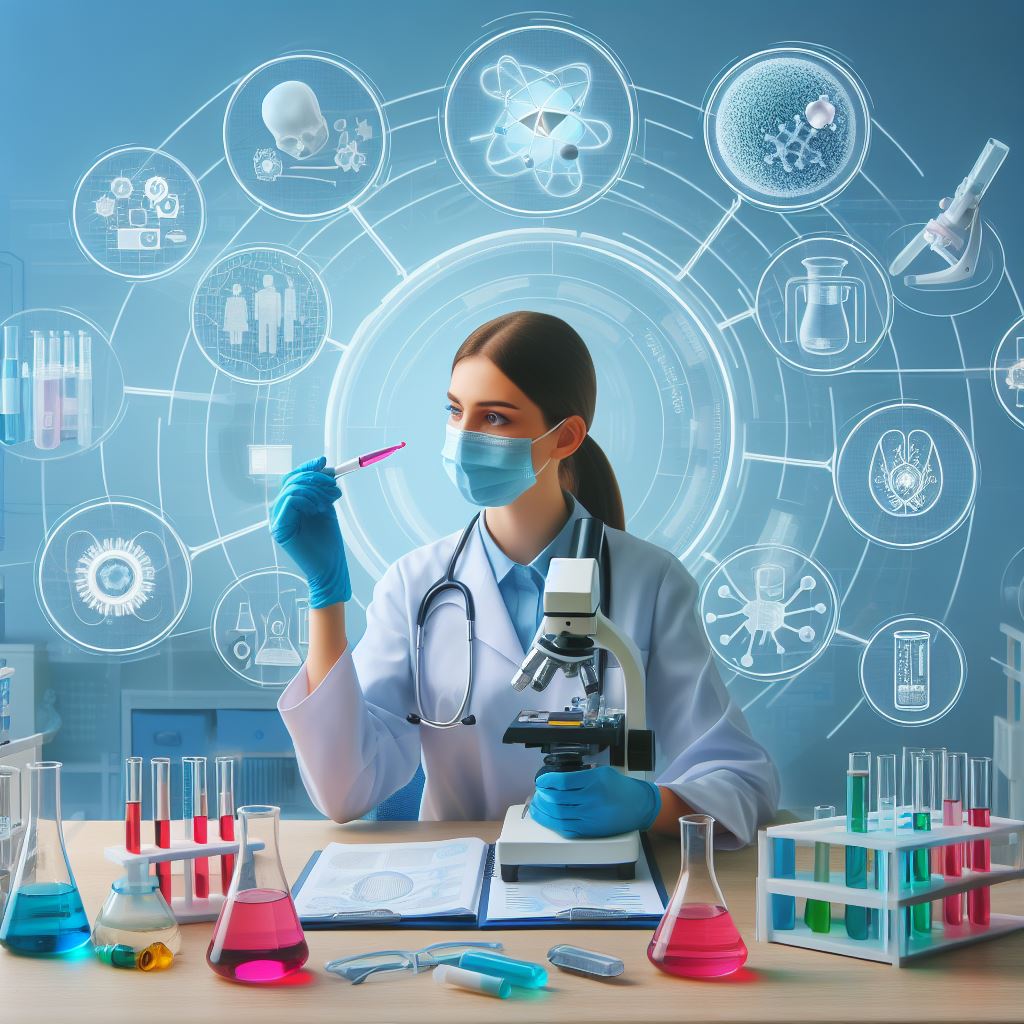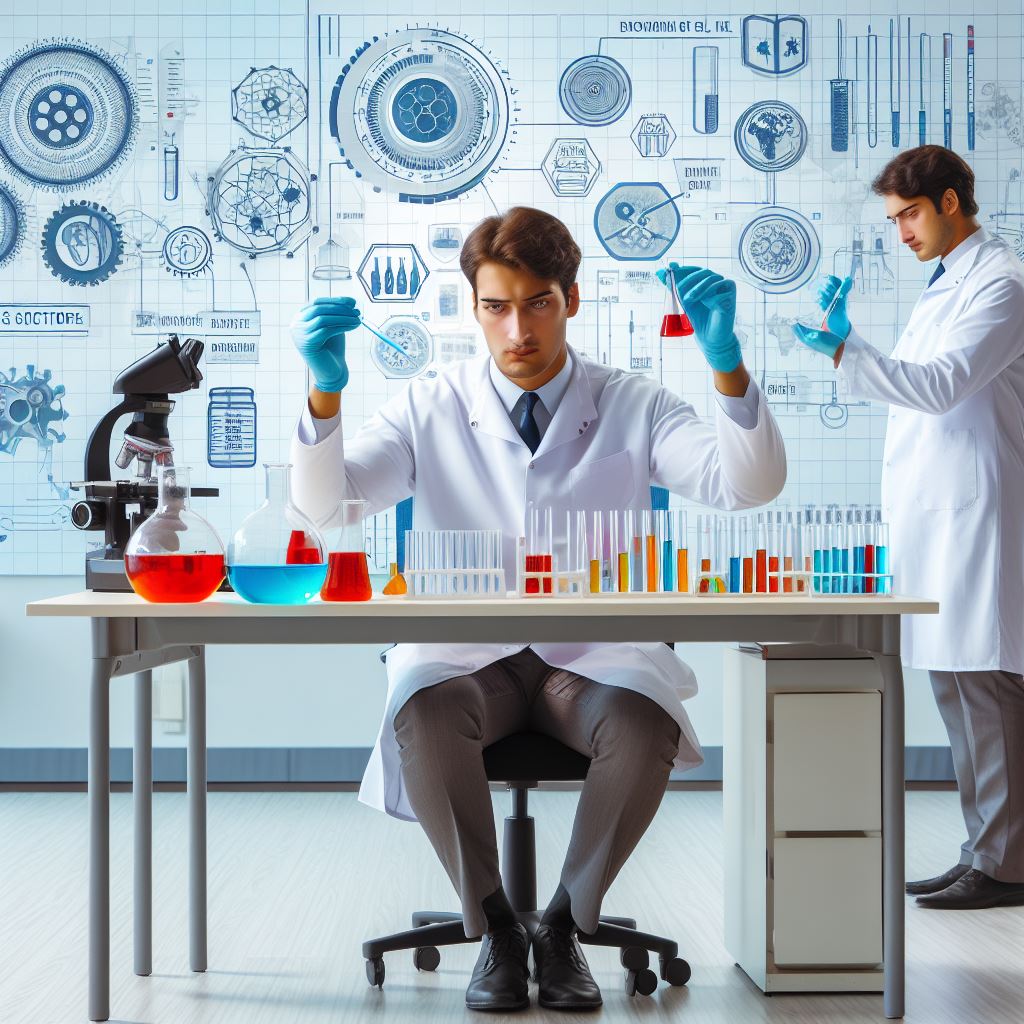Introduction
In the healthcare industry, lab technicians play a crucial role in the diagnosis and treatment process.
With their assistance, doctors are able to accurately identify diseases and develop appropriate treatment plans.
Lab technicians are responsible for conducting various tests, analyzing samples, and providing vital information to healthcare professionals.
The importance of lab technicians cannot be overstated. They are instrumental in helping doctors make informed decisions about patient care.
Lab technicians handle and analyze a wide range of specimens, including blood, urine, tissue samples, and more.
Their attention to detail and precision ensure accurate results, ultimately leading to better patient outcomes.
Moreover, there is a growing demand for lab technicians in different healthcare settings.
As the population continues to age and medical advancements are made, the need for lab technicians is steadily increasing.
Hospitals, clinics, research laboratories, and even pharmaceutical companies all require the expertise of lab technicians.
Lab technicians have a variety of career pathways available to them. They can specialize in areas such as hematology, microbiology, immunology, or pathology.
With further education and experience, they can also move into supervisory or management roles.
Additionally, some lab technicians choose to pursue higher education and become medical laboratory scientists or technologists.
In essence, lab technicians are an integral part of the healthcare industry. Their skills and knowledge are essential for accurate diagnosis and effective treatment.
The demand for lab technicians is on the rise, and there are numerous opportunities for career growth and specialization in this field.
Overview of Lab Technician Career
Lab technicians play a crucial role in the healthcare industry by providing essential support to medical professionals. They are responsible for performing various tasks and ensuring accurate test results.
Responsibilities and Tasks
- Collecting and analyzing samples, such as blood, urine, and tissue, for diagnostic purposes.
- Preparing specimens and setting up equipment to conduct laboratory tests.
- Operating and maintaining laboratory instruments and ensuring their accuracy.
- Following strict protocols and safety measures to prevent contamination and ensure reliable results.
- Recording and documenting test results, maintaining accurate records to assist with patient diagnosis and treatment.
- Collaborating with healthcare professionals, such as doctors and pathologists, to provide accurate and timely test results.
- Assisting in research studies, clinical trials, and the development of new laboratory techniques.
- Providing technical support and troubleshooting for laboratory equipment and instruments.
Education and Training
To become a lab technician, one typically needs an associate degree or a postsecondary certificate in medical laboratory technology.
Some employers may also require certification through organizations such as the American Society for Clinical Pathology (ASCP).
The education and training programs focus on developing knowledge and skills in areas such as laboratory procedures, medical terminology, microbiology, and clinical chemistry.
Students also receive hands-on training in various laboratory techniques and gain experience working with different types of samples and instruments.
Continuing education and staying updated with advances in laboratory technology are essential for lab technicians to maintain their competence and adapt to changing healthcare practices.
In addition to formal education, certain qualities and skills are crucial for success as a lab technician. These include:
- Attention to detail: Lab technicians must be meticulous and thorough in their work to ensure accurate results and avoid errors.
- Analytical thinking: They need to interpret complex data, identify abnormalities, and troubleshoot issues that may affect test results.
- Communication skills: Lab technicians often interact with healthcare professionals and patients, so effective communication is important to convey information clearly.
- Technical proficiency: They must have a strong understanding of laboratory equipment and techniques and keep up with advancements in the field.
- Time management: Lab technicians juggle multiple tasks and must prioritize their work to meet deadlines and ensure efficient laboratory operations.
In general, a career as a lab technician in healthcare offers a rewarding opportunity to contribute to patient care and diagnostics.
With the right education, skills, and dedication, lab technicians can play a vital role in the ever-evolving field of healthcare.
Read: Marine Biology Careers in Canada: A Deep Dive
Job Opportunities in Healthcare Settings
Lab technicians in healthcare have a range of job opportunities across various settings:
Unlock Your Career Potential
Visualize a clear path to success with our tailored Career Consulting service. Personalized insights in just 1-3 days.
Get Started- Hospitals: Lab technicians play a crucial role in hospitals by conducting various medical tests and analyzing samples to aid in diagnosis and treatment.
- Clinics: Lab technicians in clinics perform a variety of tests to assist doctors in diagnosing and monitoring patient health.
- Research Laboratories: Lab technicians in research labs conduct experiments, collect data, and analyze samples to contribute to scientific discoveries.
- Diagnostic Centers: Lab technicians in diagnostic centers specialize in running tests like blood work, biopsies, and imaging to aid in disease detection and prevention.
The roles and responsibilities of lab technicians in hospitals, clinics, research laboratories, and diagnostic centers
Within these settings, lab technicians have specific roles and responsibilities:
- Sample Collection and Preparation: Lab technicians collect and handle patient samples, ensuring proper labeling and storage for accurate testing.
- Performing Tests: Lab technicians perform various tests, such as blood analysis, urine tests, and tissue examinations, following strict protocols and using advanced equipment.
- Quality Control: Lab technicians ensure the proficiency and accuracy of test results by conducting quality control measures and calibrating equipment regularly.
- Data Analysis: Lab technicians analyze test results, interpret findings, and prepare reports for healthcare professionals to aid in diagnosis and treatment decisions.
- Maintaining Lab Equipment: Lab technicians are responsible for the proper maintenance and cleaning of lab equipment to ensure accurate and reliable test results.
How lab technicians contribute to patient care and treatment
Lab technicians’ contributions are vital to patient care and treatment:
- Diagnosis and Treatment: Lab technicians’ accurate and timely test results help doctors diagnose medical conditions and determine appropriate treatment plans.
- Disease Monitoring: Lab technicians monitor patients’ response to treatment by conducting repeat tests and analyzing changes in results over time.
- Research and Development: Lab technicians contribute to medical research by participating in studies, analyzing data, and discovering new insights.
- Infection Control: Lab technicians play a crucial role in preventing the spread of infections by performing tests to detect and identify pathogens.
- Blood Transfusion Safety: Lab technicians ensure blood compatibility and safety before transfusion to avoid potential reactions and complications.
Lab technicians also have significant career growth opportunities:
- Specialization: Lab technicians can specialize in areas like microbiology, hematology, immunology, or molecular biology for advanced expertise.
- Management Roles: Experienced lab technicians can move into supervisory or managerial positions, overseeing lab operations and personnel.
- Teaching and Training: Lab technicians can become educators or trainers, sharing their knowledge and expertise with aspiring technicians.
- Research Positions: Lab technicians can pursue research careers in academic institutions, pharmaceutical companies, or public health organizations.
- Advanced Education: Lab technicians can further their education and become scientists, medical technologists, or pathologists.
In fact, lab technicians in healthcare settings have diverse job opportunities and contribute significantly to patient care through their crucial roles and responsibilities.
With continuous advancements in healthcare and technology, this field offers ample scope for career growth and specialization.
Read: Environmental Science Internships in Canada
Specialization Options for Lab Technicians
Lab technicians in healthcare have various specialization options available to them, allowing them to focus on specific areas of laboratory technology.
Specializing in a particular field can provide numerous benefits, including enhanced job prospects and increased expertise in a specific area.
Some of the specialized areas for lab technicians in healthcare include:
- Clinical Chemistry: Lab technicians specializing in clinical chemistry are responsible for analyzing body fluids and testing for chemical components to understand a patient’s health status.
- Hematology: Hematology specialists examine blood samples to identify and diagnose blood disorders and diseases, such as anemia, leukemia, or clotting disorders.
- Microbiology: Lab technicians who specialize in microbiology focus on identifying and studying microorganisms that cause infections. They perform tests to identify bacteria, viruses, and other pathogens.
- Histotechnology: Histotechnologists assist in the preparation and analysis of tissue samples collected during biopsies or surgeries. They help pathologists diagnose diseases, such as cancer, by studying cellular structures.
- Immunology: Lab technicians specializing in immunology help diagnose and monitor conditions related to the immune system. They evaluate immune system responses to infections, allergies, and autoimmune disorders.
Choosing to specialize in a specific area of laboratory technology offers several benefits:
- Enhanced Job Prospects: Specializing in a particular field can make lab technicians more marketable and increase their chances of finding employment in their preferred area.
- Increased Expertise: By focusing on a specific area, lab technicians can develop a deeper understanding of the tests, techniques, and equipment used in that area.
- Professional Growth: Specialization allows lab technicians to expand their knowledge and skills, which contributes to their professional growth and opens doors to advanced positions or higher salaries.
- Collaborative Opportunities: Specialized lab technicians often work collaboratively with other healthcare professionals, such as doctors and pathologists, providing valuable insights and contributing to patient care.
- Contribution to Research: Lab technicians with specialized knowledge can actively engage in and contribute to research projects, helping to advance scientific knowledge and improve patient outcomes.
Factors to consider before specialization as a lab technician
However, it is essential to consider a few factors before choosing to specialize as a lab technician:
- Interest and Passion: Choose a specialization that aligns with your interests and passions, as it will be easier to stay motivated and excel in your chosen area.
- Future Demand: Research and evaluate the demand for specific specializations to ensure that your chosen area will offer stability and growth opportunities in the long run.
- Continuing Education: Specializing may require additional certifications or advanced degrees, so consider your willingness to invest time and effort in continuing education.
- Job Market: Explore job market trends and potential job opportunities in your chosen specialization to make an informed decision.
Basically, lab technicians in healthcare can specialize in various areas such as clinical chemistry, hematology, microbiology, histotechnology, and immunology.
Specialization brings several benefits, including enhanced job prospects and increased expertise.
However, it is crucial to consider personal interests, demand, continuing education, and job market factors before choosing a specialization.
Specializing as a lab technician can lead to a rewarding and fulfilling career in healthcare.
Read: Top Canadian Universities for Aspiring Biologists

Advancement and Career Growth
Lab technicians in healthcare have various opportunities for advancement and career growth.
With the right skills and experience, lab technicians can climb the ladder within their field and take on higher positions.
Potential for Advancement
- Lab technicians who excel in their roles have great potential for advancement.
- Continuing education and acquiring specialized certifications can significantly enhance career prospects.
- Mastering new technologies and staying updated with the latest advancements is important for growth.
- Networking with professionals in the healthcare industry can open doors to new opportunities.
- Developing strong relationships with colleagues and supervisors can increase chances of advancement.
Promotion and Higher Positions
- Lab technicians can progress to supervisory positions, where they oversee a team of technicians.
- With experience and additional qualifications, lab technicians can become lab managers.
- Lab directors oversee multiple labs and have a high level of responsibility.
- Within specialized areas like clinical chemistry or microbiology, technicians can become specialists.
- Research institutions and pharmaceutical companies often offer higher-level positions for lab technicians.
Transitioning into Supervisory or Managerial Roles
- Lab technicians can transition into supervisory roles by showcasing leadership skills.
- Obtaining extra training in management and acquiring managerial certifications can aid in this transition.
- Learning how to effectively manage a team and communicate with colleagues is crucial.
- Supervisory and managerial roles require strong organizational and problem-solving skills.
- Lab technicians who have a passion for teaching can explore opportunities in academia.
Lab technicians who are dedicated to their profession and strive for excellence have an endless array of possibilities for advancement.
Working with determination and a strong work ethic can lead to an exciting and fulfilling career path.
It is important for lab technicians to identify their strengths and areas of interest. Specializing in a certain area of laboratory technology can help in becoming a sought-after professional.
Continued education and professional development are crucial for staying competitive in the field.
Lab technicians can also explore opportunities for growth outside of traditional healthcare settings.
Pharmaceutical companies, research institutions, and government agencies offer various roles with higher responsibilities and better compensation.
Networking with professionals in the industry, attending conferences and workshops, and joining relevant associations can enhance career prospects.
Building a strong professional network can provide access to insider information about job openings and upcoming opportunities.
Therefore, lab technicians in healthcare have immense potential for advancement and career growth.
By acquiring additional qualifications, developing strong relationships, and showcasing leadership skills, lab technicians can progress to higher positions and even transition into supervisory or managerial roles.
The field of laboratory technology is constantly evolving, offering numerous avenues for expansion and specialization.
With dedication and continuous learning, lab technicians can achieve their career goals and enjoy a rewarding professional journey.
Read: Salary Range for Biologists in Canada: 2024 Update
Continuing Education and Professional Development
Continuing education and professional development are crucial for lab technicians in healthcare.
As technology and research advances, it becomes necessary to stay updated with the latest advancements to enhance career prospects.
Importance of Continuing Education
- Continuing education ensures that lab technicians remain competent and up-to-date in their field.
- It promotes continuous improvement and a commitment to lifelong learning.
- Professionals who engage in continuing education are more likely to provide high-quality patient care.
- It allows lab technicians to expand their knowledge and skills beyond their initial training.
Availability of Professional Development Programs
- There are various professional development programs specifically designed for lab technicians.
- These programs provide opportunities to enhance technical skills, critical thinking, and problem-solving abilities.
- Some programs focus on specialized areas such as molecular diagnostics or clinical chemistry.
- Professional organizations like the American Society for Clinical Laboratory Science offer resources and programs for lab technicians.
Certifications and Workshops
- Obtaining certifications in specific areas of laboratory science can significantly boost career prospects.
- Certifications demonstrate expertise and proficiency, making lab technicians more competitive in the job market.
- Workshops and conferences provide opportunities to learn about the latest techniques and technologies.
- Attending these events also allows lab technicians to network with peers and experts in the field.
Benefits of Staying Updated
- Staying updated with the latest advancements improves the accuracy and efficiency of lab work.
- Lab technicians who are knowledgeable about current research contribute to improved patient outcomes.
- Employers value lab technicians who are proactive in their professional development.
- Continuous learning opens up opportunities for career advancement and higher salaries.
In general, continuing education and professional development are essential for lab technicians in healthcare.
By staying updated with the latest advancements, participating in professional programs, obtaining certifications, and attending workshops, lab technicians can enhance their knowledge, skills, and career prospects.
It is crucial for lab technicians to prioritize their professional development to provide the best possible patient care and succeed in their careers.
Job Outlook and Salary Range
- Lab technicians in healthcare have a positive job outlook due to increasing demand.
- The field is projected to grow by 7% from 2019 to 2029.
- Factors contributing to the demand include advances in medical technology and an aging population.
- The average salary range for lab technicians varies based on the healthcare setting.
- In hospitals, the average salary range is between $38,000 and $61,000 per year.
- In diagnostic laboratories, the average salary range is between $35,000 and $55,000 per year.
- In medical and diagnostic laboratories, the average salary range is between $38,000 and $62,000 per year.
- In physicians’ offices, the average salary range is between $35,000 and $55,000 per year.
- In research and development, the average salary range is between $40,000 and $70,000 per year.
- Overall, lab technicians in healthcare enjoy competitive salaries and job security.
- This is due to the essential role they play in diagnosing and treating illnesses.
- The projected growth in the field is promising for aspiring lab technicians.
- However, it is essential to keep in mind that job opportunities may vary based on location.
- Urban areas and regions with a higher population tend to have more job prospects.
- Lab technicians with specialized skills or additional certifications may have even better job prospects.
- Continuing education and staying updated with the latest technologies can also contribute to career advancement.
- Lab technicians can expect a fulfilling career path with opportunities for professional growth.
- With the increasing demand for healthcare services, lab technicians will continue to be in high demand.
- The job outlook for lab technicians is expected to remain positive in the coming years.
- In conclusion, lab technicians in healthcare have a bright future ahead with a favorable job outlook.
- The projected growth in the field and competitive salaries make it an attractive career choice.
Conclusion
A career as a lab technician in healthcare offers diverse opportunities and job stability.
Lab technicians play a crucial role in the healthcare system, performing vital tests and assisting in the diagnosis and treatment process.
By summarizing patient samples, operating sophisticated laboratory equipment, and analyzing results, lab technicians contribute to improving patient care and outcomes.
This field also provides opportunities for advancement and specialization, with options to work in various healthcare settings such as hospitals, clinics, research facilities, and pharmaceutical companies.
Considering a career as a lab technician in healthcare is a wise choice due to the increasing demand for skilled professionals.
As the healthcare industry continues to expand, the need for lab technicians will only grow, ensuring job security and a fulfilling career path.
In addition to the job prospects, pursuing a career as a lab technician also offers personal satisfaction.
Every day, lab technicians have the opportunity to contribute to scientific advancements, directly impacting patient care and overall healthcare practices.
For those interested in exploring this career path further, there are various resources available.
Online courses, vocational programs, and community colleges offer training and education programs specifically designed for aspiring lab technicians.
Professional organizations such as the American Society for Clinical Laboratory Science (ASCLS) and the Clinical and Laboratory Standards Institute (CLSI) provide networking opportunities, educational materials, and career support.
A career as a lab technician in healthcare is both rewarding and promising. The field offers stability, personal satisfaction, and the ability to make a significant impact on healthcare.
Consider joining this thriving profession and embark on a journey of continuous learning and growth.




